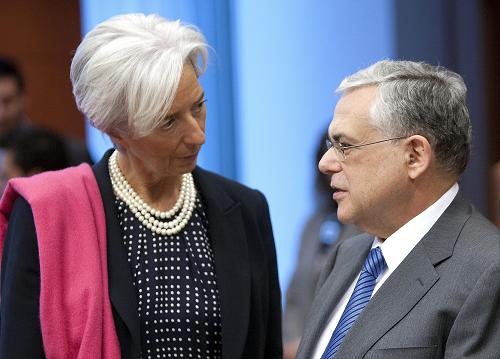Eurozone OKs Greek bailout plan
 0 Comment(s)
0 Comment(s) Print
Print E-mail Xinhua, February 21, 2012
E-mail Xinhua, February 21, 2012
 |
|
Christine Lagarde(L), Managing Director of the International Monetary Fund?talkes with Greek Prime Minister Lucas Papademos at the Eurozone finance ministers meeting in Brussells on Feb 20, 2012. [Xinhua Photo] |
Eurozone finance ministers had approved a second bailout deal for debt-laden Greece, averting its imminent default and temporarily putting an end to months of uncertainty that had overshadowed the eurozone, Eurogroup chief Jean-Claude Juncker said early Tuesday.
"After a meeting of at least 13 hours, we have reached a far reaching agreement on Greece's new programme and private sector involvement (PSI) that would lead to a significant debt reduction for Greece," Juncker said at a press conference after a prolonged meeting of eurozone finance ministers.
The bailout plan is estimated to amount to 130 billion euro (about 172 billion U.S. dollars) until 2014, aiming to bring down Greece's debt-to-GDP ratio to 120.5 percent by 2020 from the current 160 percent, Juncker told reporters.
"Greece will launch bond exchange offer in coming days. And given the balanced agreement reached with the creditor group led by the IIF and the fact that the package delivers debt sustainability for Greece, we expect a high participation rate," he added.
This second bailout package, designed by the "troika" of the International Monetary Fund, the European Union and the European Central Bank, will enable Greece to repay bonds of 14.5 billion euros (about 19.2 billion dollars) which come due on March 20, avoiding a default and a potential exit from the European single currency zone.
Private sector holders of Greek debt were expected to accept a reduction of 53.5 percent on the face value of their bonds as part of a debt exchange that involves about 200 billion euros (265 billion dollars), Juncker said.
The real losses of private Greek bondholders are expected to be deeper than the previous 70 percent, when they were offered a 50-percent haircut on their Greek bonds, analysts said.
Go to Forum >>0 Comment(s)
 Add your comments...
Add your comments...
- User Name Required
- Your Comment
- Racist, abusive and off-topic comments may be removed by the moderator.





